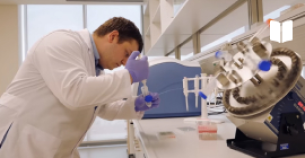Frequently searched keywords:
A New HPV Test Developed at Acıbadem University
Haber tarihi: 03/02/2025
Last update date: 06.02.2025
Cervical cancer, the second most common cancer among women after breast cancer, is largely preventable with early diagnosis. Detecting it early requires analyzing a cervical swab sample collected during a gynecological examination. However, a groundbreaking new method developed at Acıbadem University Technology Center now enables HPV testing through urine samples instead of cervical swabs. This innovation, which has been recognized with an award from the Turkish Academy of Sciences (TÜBA), is expected to increase the rate of HPV testing due to its practicality and ease of use.
Cervical cancer ranks as the most common type of gynecological cancer, with nearly 99.7% of cases caused by the Human Papillomavirus (HPV). Research indicates that cervical cancer, driven by certain strains of this widespread virus, claims the life of one woman every two minutes worldwide. Yet, early detection of HPV—the primary cause of cervical cancer—is possible. The virus can be identified through an HPV-DNA test performed on a cervical swab sample collected during an annual gynecological exam. However, low participation rates in routine gynecological check-ups result in fewer screenings, reducing the chances of early detection. As a consequence, the virus remains undiagnosed in many women, increasing the risk of cervical cancer development and progression. Addressing this challenge, researchers have introduced a new, more practical approach that allows HPV detection through urine samples instead of cervical swabs. This innovation is expected to significantly improve early diagnosis rates. Developed by Prof. Dr. Tanıl Kocagöz, Head of Microbiology at Acıbadem University School of Medicine, Prof. Dr. Özge Can, Head of the Department of Bioengineering, and their research team, this method simplifies both individual and large-scale HPV screenings. The newly developed urine-based HPV test is now available at Acıbadem Hospitals, offering a more accessible and convenient alternative for early detection and prevention of cervical cancer.
TÜBA Award-Winning Method
A groundbreaking urine-based HPV testing method, hailed as a major milestone in the fight against cervical cancer, has been developed by Bio-T at Acıbadem University Technology Center. MyMagiCon technology concentrates biological fluids to enable highly sensitive testing, During the COVID-19 pandemic, Prof. Dr. Tanıl Kocagöz and his team were the first in the world to conduct COVID-19 testing using mouthwash instead of a nasal swab. "Instead of using an invasive swab inserted through the nose and throat, we simplified the test by analyzing a mouthwash sample," says Prof. Dr. Kocagöz. "Now, using the same principle, we can perform HPV testing by concentrating urine instead of using cervical swabs." This new technique delivers results comparable to traditional cervical swab tests and has been recognized with an award from the Turkish Academy of Sciences (TÜBA). Additionally, with its CE certification, the method meets European quality standards, making it a promising advancement in the global effort to enhance HPV screening and cervical cancer prevention.
New Urine-Based HPV Test Simplifies Mass Screening
Many women delay routine cervical cancer screenings due to the discomfort associated with traditional cervical swab tests, according to Prof. Dr. Tanıl Kocagöz, Head of the Department of Medical Microbiology at Acıbadem University School of Medicine. However, a new HPV testing method, developed at the university since 2017, is set to revolutionize the screening process by making it significantly more accessible and comfortable. “The greatest advantage of this technological breakthrough is that HPV testing can now be performed using a simple urine sample, eliminating the need for an invasive cervical swab, This innovation not only makes the process more convenient but also enhances women’s access to routine health screenings. Experts recommend that sexually active women aged 25 to 65 undergo HPV testing every 2-3 years. HPV can develop into cancer within approximately seven years after infection, making early detection crucial,” Prof. Dr. Kocagöz explains. He also highlights that this new testing method aligns with the World Health Organization’s (WHO) screening recommendations, reinforcing its potential as a game-changer in cervical cancer prevention.
At-Home HPV Test is in Progress
Highlighting the inconvenience of gynecological examinations, Prof. Dr. Tanıl Kocagöz points out that around 80% of the target population for HPV screening avoids visiting a doctor. However, the introduction of urine-based HPV testing is expected to significantly expand access to screening. “With this test, we can reach a much broader population,” he explains. “Additionally, this method is also applicable to men, as sexually transmitted HPV can cause serious health issues in males as well.” Looking ahead, Prof. Dr. Kocagöz reveals that research is underway to develop at-home testing kits. “We believe this method will not only simplify HPV detection but also pave the way for urine-based diagnosis of various other diseases in the future.”
Now Available at Acıbadem Hospitals
The Urine-Based HPV Test, a first in Türkiye, is currently available at Acıbadem Hospitals. Individuals can undergo testing without requiring a prior medical examination, either by scheduling an appointment or directly visiting the laboratory.







